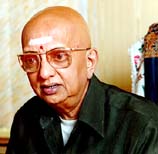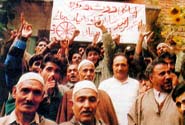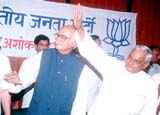'Separatism in Kashmir has to be put
down mercilessly, by use of force'
 Cho Ramaswamy, actor, commentator,
journalist, and now television personality, discusses the
state of India 50 years after it won freedom.
Cho Ramaswamy, actor, commentator,
journalist, and now television personality, discusses the
state of India 50 years after it won freedom.
A candid conversation on India's leaders, its people, its
future, and, of course, corruption, liberalisation and secularism,
with Shobha Warrier.
There is much talk about autonomy for Kashmir these days. If it happens,
what would be the repercussions for the other parts of the country?
 I am against it. I am supposed to be highly reactionary in
my thinking on certain matters. Kashmir is one example of that.
If there is a demand for separatism in Kashmir, it has to be put
down mercilessly, by use of force. As far as more autonomy is
concerned, if Kashmir is granted that, then the other states also
will start claiming it. Some of the North Eastern states already
claim that. And it may spread to states like Tamil Nadu also.
Not because the people want it, but because the political leadership
demands it.
I am against it. I am supposed to be highly reactionary in
my thinking on certain matters. Kashmir is one example of that.
If there is a demand for separatism in Kashmir, it has to be put
down mercilessly, by use of force. As far as more autonomy is
concerned, if Kashmir is granted that, then the other states also
will start claiming it. Some of the North Eastern states already
claim that. And it may spread to states like Tamil Nadu also.
Not because the people want it, but because the political leadership
demands it.
What will happen if regional leaders start demanding
autonomy for their provinces?
I think the BJP will gain ground, if that happens. They will
be the beneficiary ultimately, as they would emerge as the uncompromising
champions of national integrity in such a situation.
 The way things are going, do you think we will have
a hung Parliament in the future too?
The way things are going, do you think we will have
a hung Parliament in the future too?
I think it is going to be the case for some more time. The
Congress must get united. The Janata Dal must evaporate because
it is a political anomaly and anachronism. It has no business to
exist. They can merge with the Congress. The Congress
and BJP must be the two parties contending for power.
If that comes about, we can avoid a hung Parliament. I don't see
it happening in the next five years or so. So, the next election
also may produce a hung Parliament.
How do you assess the United Front government?
The prime minister's main job seems to be go, meet
and placate all and sundry so that his chair is intact.
As far as the United Front is concerned, they don't agree with
each other on many issues. Just for the sake of power, they are
trying to make certain compromises and carry on.
The one danger
inbuilt in the situation is that foreign investors may hesitate
because of the uncertainty. It will be in a confused state of
affairs for some more time.
Do you think the BJP will be a major force in India?
I think so. I think it is destined to be one of the major political
parties. It already is.
But even though the BJP emerged as the single largest
party in recent elections, it did not have adequate numbers to rule.
Take UP, for instance.
It will take some more time for them to obtain a majority by
themselves. Take the Congress, it did not attain a majority even
last time. When Narasimha Rao became prime minister, they
were a minority government.
Why is it that all the other political parties see the BJP as a
threat to the nation? They say the BJP is communal in outlook. At the same
time they ally with casteist parties.
The other parties are casteist. As far as communalism is concerned,
the BJP is not out to harm the Muslims. In my opinion, that is
not the plan or idea of the party at all. The other parties perceive it (the
BJP) as a common threat because if the other
votes get split, in many northern states and probably in Karnataka,
the BJP will be the largest vote getter. Not only the largest single
party.
I would personally like the BJP to abandon this temple politics. It is not a very encouraging
sight to see sadhus with huge big beards, holding tridents in
their hands and asking you to vote for a particular party. It
is not canvassing, it is threatening. The BJP should get rid of
this association.
It mught have helped them at a particular moment
when V P Singh was trying to divide the BJP vote by promoting
the Mandal concept. He succeeded to an extent, but it recoiled
on him later.
At that particular time,
the temple politics might have helped them but it is high time
they gave it up. And I think the BJP leadership is aware of
it, particularly Advani.
Why are the so-called intellectuals and media anti-BJP?
Everyone is very much concerned about a secular image without
understanding the concept of secularism. No editor would like
to be called communal. The moment you support the BJP, you are branded
communal. Secularism in India is defined as an anti-BJP stance.
If you are anti-BJP, you are secular. You may hobnob with the
Muslim League, still you are secular because you are opposed to
the BJP.
Was V P Singh's Mandal period one of the worst times for
India?
 V P Singh's period was an aberration. I have always been opposed
to that man. So, you are at liberty to consider my views
as prejudiced. From the moment he stepped out of the Congress
and even before that, I was a critic of V P Singh and his politics.
I warned Chandra Shekhar, I warned Hegde, I warned all my friends
in the Janata Party. Beware of V P Singh, beware of V P Singh.
V P Singh's period was an aberration. I have always been opposed
to that man. So, you are at liberty to consider my views
as prejudiced. From the moment he stepped out of the Congress
and even before that, I was a critic of V P Singh and his politics.
I warned Chandra Shekhar, I warned Hegde, I warned all my friends
in the Janata Party. Beware of V P Singh, beware of V P Singh.
But they thought he just wanted
the Opposition to come together and replace the Congress at the
Centre and that he did not want to become prime minister.
But I said that was his game. Becoming prime minister, making
others propose him and then accepting the chair with great reluctance.
I was the only journalist who wrote that Devi Lal who betrayed
Chandra Shekhar to make V P Singh prime minister would
betray V P Singh to make Chandra Shekhar prime minister. It
happened ultimately.
V P Singh serving as a minister in the Rajiv Gandhi Cabinet spied
on him by employing an outside agency. A Cabinet minister who
can do this to his own prime minister must be the worst betrayer
imaginable. From the moment he did it I saw the man as dangerous.
He was not a votary for reservation for the backward classes before
he brought about the revival of the Mandal report.
The Mandal Commission was appointed during the Janata Party period.
But the report was filed
after the Janata Party government fell. When the BJP started disagreeing
with him seriously V P Singh thought that he should contain the
BJP by taking away the backward classes from them. That was why
he brought about the implementation of the Mandal proposals.
Don't you think he did a lot of damage to India by doing that?
These days even in school children talk about forward classes
and backward classes.
Definitely. Yes, nowadays, in colleges, schools and everywhere
caste is being talked about.
Is it not a dangerous trend?
One should blame V P Singh for this, nobody else. For his own
chair, he divided Hindu society irreparably.
|

